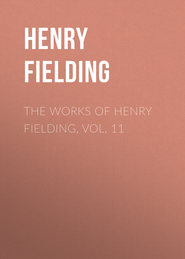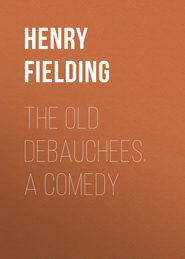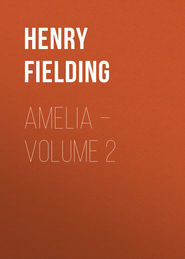По всем вопросам обращайтесь на: info@litportal.ru
(©) 2003-2024.
✖
Amelia – Complete
Настройки чтения
Размер шрифта
Высота строк
Поля
“I have no Greek ears, sir,” said Mrs. Atkinson. “I believe I could understand it in the Delphin Homer.”
“I wish,” cries he, “my dear child (to Amelia), you would read a little in the Delphin Aristotle, or else in some Christian divine, to learn a doctrine which you will one day have a use for. I mean to bear the hardest of all human conflicts, and support with an even temper, and without any violent transports of mind, a sudden gust of prosperity.”
“Indeed,” cries Amelia, “I should almost think my husband and you, doctor, had some very good news to tell me, by your using, both of you, the same introduction. As far as I know myself, I think I can answer I can support any degree of prosperity, and I think I yesterday shewed I could: for I do assure you, it is not in the power of fortune to try me with such another transition from grief to joy, as I conceived from seeing my husband in prison and at liberty.”
“Well, you are a good girl,” cries the doctor, “and after I have put on my spectacles I will try you.”
The doctor then took out a newspaper, and read as follows:
“‘Yesterday one Murphy, an eminent attorney-at-law, was committed to Newgate for the forgery of a will under which an estate hath been for many years detained from the right owner.’
“Now in this paragraph there is something very remarkable, and that is – that it is true: but opus est explanatu. In the Delphin edition of this newspaper there is the following note upon the words right owner: – ‘The right owner of this estate is a young lady of the highest merit, whose maiden name was Harris, and who some time since was married to an idle fellow, one Lieutenant Booth. And the best historians assure us that letters from the elder sister of this lady, which manifestly prove the forgery and clear up the whole affair, are in the hands of an old Parson called Doctor Harrison.’”
“And is this really true?” cries Amelia.
“Yes, really and sincerely,” cries the doctor. “The whole estate; for your mother left it you all, and is as surely yours as if you was already in possession.”
“Gracious Heaven!” cries she, falling on her knees, “I thank you!” And then starting up, she ran to her husband, and, embracing him, cried, “My dear love, I wish you joy; and I ought in gratitude to wish it you; for you are the cause of mine. It is upon yours and my children’s account that I principally rejoice.”
Mrs. Atkinson rose from her chair, and jumped about the room for joy, repeating,
Turne, quod oplanti divum promittere nemo Auderet, volvenda dies, en, attulit ultro.[21 - “What none of all the Gods could grant thy vows, That, Turnus, this auspicious day bestows."]
Amelia now threw herself into a chair, complained she was a little faint, and begged a glass of water. The doctor advised her to be blooded; but she refused, saying she required a vent of another kind. She then desired her children to be brought to her, whom she immediately caught in her arms, and, having profusely cried over them for several minutes, declared she was easy. After which she soon regained her usual temper and complexion.
That day they dined together, and in the afternoon they all, except the doctor, visited Captain Atkinson; he repaired to the bailiff’s house to visit the sick man, whom he found very chearful, the surgeon having assured him that he was in no danger.
The doctor had a long spiritual discourse with Robinson, who assured him that he sincerely repented of his past life, that he was resolved to lead his future days in a different manner, and to make what amends he could for his sins to the society, by bringing one of the greatest rogues in it to justice. There was a circumstance which much pleased the doctor, and made him conclude that, however Robinson had been corrupted by his old master, he had naturally a good disposition. This was, that Robinson declared he was chiefly induced to the discovery by what had happened at the pawnbroker’s, and by the miseries which he there perceived he had been instrumental in bringing on Booth and his family.
The next day Booth and his wife, at the doctor’s instance, dined with Colonel James and his lady, where they were received with great civility, and all matters were accommodated without Booth ever knowing a syllable of the challenge even to this day.
The doctor insisted very strongly on having Miss Harris taken into custody, and said, if she was his sister, he would deliver her to justice. He added besides, that it was impossible to skreen her and carry on the prosecution, or, indeed, recover the estate. Amelia at last begged the delay of one day only, in which time she wrote a letter to her sister, informing her of the discovery, and the danger in which she stood, and begged her earnestly to make her escape, with many assurances that she would never suffer her to know any distress. This letter she sent away express, and it had the desired effect; for Miss Harris, having received sufficient information from the attorney to the same purpose, immediately set out for Poole, and from thence to France, carrying with her all her money, most of her cloaths, and some few jewels. She had, indeed, packed up plate and jewels to the value of two thousand pound and upwards. But Booth, to whom Amelia communicated the letter, prevented her by ordering the man that went with the express (who had been a serjeant of the foot-guards recommended to him by Atkinson) to suffer the lady to go whither she pleased, but not to take anything with her except her cloaths, which he was carefully to search. These orders were obeyed punctually, and with these she was obliged to comply.
Two days after the bird was flown a warrant from the lord chief justice arrived to take her up, the messenger of which returned with the news of her flight, highly to the satisfaction of Amelia, and consequently of Booth, and, indeed, not greatly to the grief of the doctor.
About a week afterwards Booth and Amelia, with their children, and Captain Atkinson and his lady, all set forward together for Amelia’s house, where they arrived amidst the acclamations of all the neighbours, and every public demonstration of joy.
They found the house ready prepared to receive them by Atkinson’s friend the old serjeant, and a good dinner prepared for them by Amelia’s old nurse, who was addressed with the utmost duty by her son and daughter, most affectionately caressed by Booth and his wife, and by Amelia’s absolute command seated next to herself at the table. At which, perhaps, were assembled some of the best and happiest people then in the world.
Chapter ix. – In which the history is concluded
Having brought our history to a conclusion, as to those points in which we presume our reader was chiefly interested, in the foregoing chapter, we shall in this, by way of epilogue, endeavour to satisfy his curiosity as to what hath since happened to the principal personages of whom we have treated in the foregoing pages.
Colonel James and his lady, after living in a polite manner for many years together, at last agreed to live in as polite a manner asunder. The colonel hath kept Miss Matthews ever since, and is at length grown to doat on her (though now very disagreeable in her person, and immensely fat) to such a degree, that he submits to be treated by her in the most tyrannical manner.
He allows his lady eight hundred pound a-year, with which she divides her time between Tunbridge, Bath, and London, and passes about nine hours in the twenty-four at cards. Her income is lately increased by three thousand pound left her by her brother Colonel Bath, who was killed in a duel about six years ago by a gentleman who told the colonel he differed from him in opinion.
The noble peer and Mrs. Ellison have been both dead several years, and both of the consequences of their favourite vices; Mrs. Ellison having fallen a martyr to her liquor, and the other to his amours, by which he was at last become so rotten that he stunk above-ground.
The attorney, Murphy, was brought to his trial at the Old Bailey, where, after much quibbling about the meaning of a very plain act of parliament, he was at length convicted of forgery, and was soon afterwards hanged at Tyburn.
The witness for some time seemed to reform his life, and received a small pension from Booth; after which he returned to vicious courses, took a purse on the highway, was detected and taken, and followed the last steps of his old master. So apt are men whose manners have been once thoroughly corrupted, to return, from any dawn of an amendment, into the dark paths of vice.
As to Miss Harris, she lived three years with a broken heart at Boulogne, where she received annually fifty pound from her sister, who was hardly prevailed on by Dr Harrison not to send her a hundred, and then died in a most miserable manner.
Mr. Atkinson upon the whole hath led a very happy life with his wife, though he hath been sometimes obliged to pay proper homage to her superior understanding and knowledge. This, however, he chearfully submits to, and she makes him proper returns of fondness. They have two fine boys, of whom they are equally fond. He is lately advanced to the rank of captain, and last summer both he and his wife paid a visit of three months to Booth and his wife.
Dr Harrison is grown old in years and in honour, beloved and respected by all his parishioners and by all his neighbours. He divides his time between his parish, his old town, and Booth’s – at which last place he had, two years ago, a gentle fit of the gout, being the first attack of that distemper. During this fit Amelia was his nurse, and her two oldest daughters sat up alternately with him for a whole week. The eldest of those girls, whose name is Amelia, is his favourite; she is the picture of her mother, and it is thought the doctor hath distinguished her in his will, for he hath declared that he will leave his whole fortune, except some few charities, among Amelia’s children.
As to Booth and Amelia, Fortune seems to have made them large amends for the tricks she played them in their youth. They have, ever since the above period of this history, enjoyed an uninterrupted course of health and happiness. In about six weeks after Booth’s first coming into the country he went to London and paid all his debts of honour; after which, and a stay of two days only, he returned into the country, and hath never since been thirty miles from home. He hath two boys and four girls; the eldest of the boys, he who hath made his appearance in this history, is just come from the university, and is one of the finest gentlemen and best scholars of his age. The second is just going from school, and is intended for the church, that being his own choice. His eldest daughter is a woman grown, but we must not mention her age. A marriage was proposed to her the other day with a young fellow of a good estate, but she never would see him more than once: “For Doctor Harrison,” says she, “told me he was illiterate, and I am sure he is ill-natured.” The second girl is three years younger than her sister, and the others are yet children.
Amelia is still the finest woman in England of her age. Booth himself often avers she is as handsome as ever. Nothing can equal the serenity of their lives. Amelia declared to me the other day, that she did not remember to have seen her husband out of humour these ten years; and, upon my insinuating to her that he had the best of wives, she answered with a smile that she ought to be so, for that he had made her the happiest of women.
THE END
notes
1
Opus est interprete. By the laws of England abusive words are not punishable by the magistrate; some commissioners of the peace, therefore, when one scold hath applied to them for a warrant against another, from a too eager desire of doing justice, have construed a little harmless scolding into a riot, which is in law an outrageous breach of the peace committed by several persons, by three at the least, nor can a less number be convicted of it. Under this word rioting, or riotting (for I have seen it spelt both ways), many thousands of old women have been arrested and put to expense, sometimes in prison, for a little intemperate use of their tongues. This practice began to decrease in the year 1749.
2
A cant term for robbery on the highway
3
Another cant term for pilfering
4
By removing the indictment by certiorari into the King’s Bench, the trial is so long postponed, and the costs are so highly encreased, that prosecutors are often tired out, and some incapacitated from pursuing. Verbum sapienti.
5
A cant word for a prison.
6
Though last not least.
7
A cant word, meaning to swear, or rather to perjure yourself
8
The burthen becomes light by being well borne.
“I wish,” cries he, “my dear child (to Amelia), you would read a little in the Delphin Aristotle, or else in some Christian divine, to learn a doctrine which you will one day have a use for. I mean to bear the hardest of all human conflicts, and support with an even temper, and without any violent transports of mind, a sudden gust of prosperity.”
“Indeed,” cries Amelia, “I should almost think my husband and you, doctor, had some very good news to tell me, by your using, both of you, the same introduction. As far as I know myself, I think I can answer I can support any degree of prosperity, and I think I yesterday shewed I could: for I do assure you, it is not in the power of fortune to try me with such another transition from grief to joy, as I conceived from seeing my husband in prison and at liberty.”
“Well, you are a good girl,” cries the doctor, “and after I have put on my spectacles I will try you.”
The doctor then took out a newspaper, and read as follows:
“‘Yesterday one Murphy, an eminent attorney-at-law, was committed to Newgate for the forgery of a will under which an estate hath been for many years detained from the right owner.’
“Now in this paragraph there is something very remarkable, and that is – that it is true: but opus est explanatu. In the Delphin edition of this newspaper there is the following note upon the words right owner: – ‘The right owner of this estate is a young lady of the highest merit, whose maiden name was Harris, and who some time since was married to an idle fellow, one Lieutenant Booth. And the best historians assure us that letters from the elder sister of this lady, which manifestly prove the forgery and clear up the whole affair, are in the hands of an old Parson called Doctor Harrison.’”
“And is this really true?” cries Amelia.
“Yes, really and sincerely,” cries the doctor. “The whole estate; for your mother left it you all, and is as surely yours as if you was already in possession.”
“Gracious Heaven!” cries she, falling on her knees, “I thank you!” And then starting up, she ran to her husband, and, embracing him, cried, “My dear love, I wish you joy; and I ought in gratitude to wish it you; for you are the cause of mine. It is upon yours and my children’s account that I principally rejoice.”
Mrs. Atkinson rose from her chair, and jumped about the room for joy, repeating,
Turne, quod oplanti divum promittere nemo Auderet, volvenda dies, en, attulit ultro.[21 - “What none of all the Gods could grant thy vows, That, Turnus, this auspicious day bestows."]
Amelia now threw herself into a chair, complained she was a little faint, and begged a glass of water. The doctor advised her to be blooded; but she refused, saying she required a vent of another kind. She then desired her children to be brought to her, whom she immediately caught in her arms, and, having profusely cried over them for several minutes, declared she was easy. After which she soon regained her usual temper and complexion.
That day they dined together, and in the afternoon they all, except the doctor, visited Captain Atkinson; he repaired to the bailiff’s house to visit the sick man, whom he found very chearful, the surgeon having assured him that he was in no danger.
The doctor had a long spiritual discourse with Robinson, who assured him that he sincerely repented of his past life, that he was resolved to lead his future days in a different manner, and to make what amends he could for his sins to the society, by bringing one of the greatest rogues in it to justice. There was a circumstance which much pleased the doctor, and made him conclude that, however Robinson had been corrupted by his old master, he had naturally a good disposition. This was, that Robinson declared he was chiefly induced to the discovery by what had happened at the pawnbroker’s, and by the miseries which he there perceived he had been instrumental in bringing on Booth and his family.
The next day Booth and his wife, at the doctor’s instance, dined with Colonel James and his lady, where they were received with great civility, and all matters were accommodated without Booth ever knowing a syllable of the challenge even to this day.
The doctor insisted very strongly on having Miss Harris taken into custody, and said, if she was his sister, he would deliver her to justice. He added besides, that it was impossible to skreen her and carry on the prosecution, or, indeed, recover the estate. Amelia at last begged the delay of one day only, in which time she wrote a letter to her sister, informing her of the discovery, and the danger in which she stood, and begged her earnestly to make her escape, with many assurances that she would never suffer her to know any distress. This letter she sent away express, and it had the desired effect; for Miss Harris, having received sufficient information from the attorney to the same purpose, immediately set out for Poole, and from thence to France, carrying with her all her money, most of her cloaths, and some few jewels. She had, indeed, packed up plate and jewels to the value of two thousand pound and upwards. But Booth, to whom Amelia communicated the letter, prevented her by ordering the man that went with the express (who had been a serjeant of the foot-guards recommended to him by Atkinson) to suffer the lady to go whither she pleased, but not to take anything with her except her cloaths, which he was carefully to search. These orders were obeyed punctually, and with these she was obliged to comply.
Two days after the bird was flown a warrant from the lord chief justice arrived to take her up, the messenger of which returned with the news of her flight, highly to the satisfaction of Amelia, and consequently of Booth, and, indeed, not greatly to the grief of the doctor.
About a week afterwards Booth and Amelia, with their children, and Captain Atkinson and his lady, all set forward together for Amelia’s house, where they arrived amidst the acclamations of all the neighbours, and every public demonstration of joy.
They found the house ready prepared to receive them by Atkinson’s friend the old serjeant, and a good dinner prepared for them by Amelia’s old nurse, who was addressed with the utmost duty by her son and daughter, most affectionately caressed by Booth and his wife, and by Amelia’s absolute command seated next to herself at the table. At which, perhaps, were assembled some of the best and happiest people then in the world.
Chapter ix. – In which the history is concluded
Having brought our history to a conclusion, as to those points in which we presume our reader was chiefly interested, in the foregoing chapter, we shall in this, by way of epilogue, endeavour to satisfy his curiosity as to what hath since happened to the principal personages of whom we have treated in the foregoing pages.
Colonel James and his lady, after living in a polite manner for many years together, at last agreed to live in as polite a manner asunder. The colonel hath kept Miss Matthews ever since, and is at length grown to doat on her (though now very disagreeable in her person, and immensely fat) to such a degree, that he submits to be treated by her in the most tyrannical manner.
He allows his lady eight hundred pound a-year, with which she divides her time between Tunbridge, Bath, and London, and passes about nine hours in the twenty-four at cards. Her income is lately increased by three thousand pound left her by her brother Colonel Bath, who was killed in a duel about six years ago by a gentleman who told the colonel he differed from him in opinion.
The noble peer and Mrs. Ellison have been both dead several years, and both of the consequences of their favourite vices; Mrs. Ellison having fallen a martyr to her liquor, and the other to his amours, by which he was at last become so rotten that he stunk above-ground.
The attorney, Murphy, was brought to his trial at the Old Bailey, where, after much quibbling about the meaning of a very plain act of parliament, he was at length convicted of forgery, and was soon afterwards hanged at Tyburn.
The witness for some time seemed to reform his life, and received a small pension from Booth; after which he returned to vicious courses, took a purse on the highway, was detected and taken, and followed the last steps of his old master. So apt are men whose manners have been once thoroughly corrupted, to return, from any dawn of an amendment, into the dark paths of vice.
As to Miss Harris, she lived three years with a broken heart at Boulogne, where she received annually fifty pound from her sister, who was hardly prevailed on by Dr Harrison not to send her a hundred, and then died in a most miserable manner.
Mr. Atkinson upon the whole hath led a very happy life with his wife, though he hath been sometimes obliged to pay proper homage to her superior understanding and knowledge. This, however, he chearfully submits to, and she makes him proper returns of fondness. They have two fine boys, of whom they are equally fond. He is lately advanced to the rank of captain, and last summer both he and his wife paid a visit of three months to Booth and his wife.
Dr Harrison is grown old in years and in honour, beloved and respected by all his parishioners and by all his neighbours. He divides his time between his parish, his old town, and Booth’s – at which last place he had, two years ago, a gentle fit of the gout, being the first attack of that distemper. During this fit Amelia was his nurse, and her two oldest daughters sat up alternately with him for a whole week. The eldest of those girls, whose name is Amelia, is his favourite; she is the picture of her mother, and it is thought the doctor hath distinguished her in his will, for he hath declared that he will leave his whole fortune, except some few charities, among Amelia’s children.
As to Booth and Amelia, Fortune seems to have made them large amends for the tricks she played them in their youth. They have, ever since the above period of this history, enjoyed an uninterrupted course of health and happiness. In about six weeks after Booth’s first coming into the country he went to London and paid all his debts of honour; after which, and a stay of two days only, he returned into the country, and hath never since been thirty miles from home. He hath two boys and four girls; the eldest of the boys, he who hath made his appearance in this history, is just come from the university, and is one of the finest gentlemen and best scholars of his age. The second is just going from school, and is intended for the church, that being his own choice. His eldest daughter is a woman grown, but we must not mention her age. A marriage was proposed to her the other day with a young fellow of a good estate, but she never would see him more than once: “For Doctor Harrison,” says she, “told me he was illiterate, and I am sure he is ill-natured.” The second girl is three years younger than her sister, and the others are yet children.
Amelia is still the finest woman in England of her age. Booth himself often avers she is as handsome as ever. Nothing can equal the serenity of their lives. Amelia declared to me the other day, that she did not remember to have seen her husband out of humour these ten years; and, upon my insinuating to her that he had the best of wives, she answered with a smile that she ought to be so, for that he had made her the happiest of women.
THE END
notes
1
Opus est interprete. By the laws of England abusive words are not punishable by the magistrate; some commissioners of the peace, therefore, when one scold hath applied to them for a warrant against another, from a too eager desire of doing justice, have construed a little harmless scolding into a riot, which is in law an outrageous breach of the peace committed by several persons, by three at the least, nor can a less number be convicted of it. Under this word rioting, or riotting (for I have seen it spelt both ways), many thousands of old women have been arrested and put to expense, sometimes in prison, for a little intemperate use of their tongues. This practice began to decrease in the year 1749.
2
A cant term for robbery on the highway
3
Another cant term for pilfering
4
By removing the indictment by certiorari into the King’s Bench, the trial is so long postponed, and the costs are so highly encreased, that prosecutors are often tired out, and some incapacitated from pursuing. Verbum sapienti.
5
A cant word for a prison.
6
Though last not least.
7
A cant word, meaning to swear, or rather to perjure yourself
8
The burthen becomes light by being well borne.












